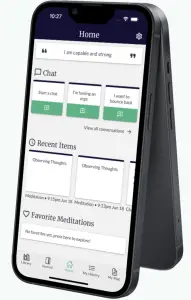Wellesley native’s mental health app aims to help people break unwanted habits
It’s that time of year when people give a fresh go of strengthening their bodies. We see them at the gym and on the roads, and hope they’ll stick with it.
Less visible are those seeking to improve their mental health, not that there isn’t plenty of overlap with those trying to boost their physical fitness. Many seek self-improvement help online, and among those addressing this demand is Brady Dowling, who grew up in Wellesley and went through the school system, where he took business classes that tapped into his entrepreneurial spirit.
 Dowling has been a software engineer over the past decade, having done stints at companies like Amazon and Chewy, and has created a mental health startup and app called Neurture.
Dowling has been a software engineer over the past decade, having done stints at companies like Amazon and Chewy, and has created a mental health startup and app called Neurture.
He’s looking at some point to make a full-time go with the start-up, which he launched in 2023 and whose software has been available on app stores since the start of last year.
“Growing up in Wellesley, I saw how we often use video games, social media, or substances to escape challenging situations or emotions, which inspired me to create an app that helps users tackle unwanted habits and addictive behaviors,” says Dowling, who acknowledges always feeling somewhat addicted to technology himself. He’ll print out articles of interest to give his eyes a rest from screens.
The Wellesley High grad says those eyes were opened while working for a company called Modern Health about all the resources—including meditation and mindfulness—available to those with mental health challenges. Many address loss of sleep and stress. What he thought was missing was an app using research-based and therapeutic methods, plus a good dose of self-compassion.
Dowling, who works on the app on the side of his day job, has partnered with clinical psychology and other experts (including his brother) to ensure the product is solid from content and user experience perspectives.
The app is artificial intelligence driven, and can make recommendations, such as for meditations, based on chats. It asks how you’re feeling and about what’s on your mind.
“We try to give people an offering for whatever level of commitment they have that day,” Dowling says. “It could be just a 5-second mood check or a quick AI chat, or a lesson from a course.”
Hoping people just find your offering out of the gazillions on app stores is wishful thinking, so developers like Dowling need to get the word out in creative ways—such as by talking with us. He’s also launched a podcast, available on Spotify and other platforms, called The Adaptive Mind, through which he explores topics such as dopamine and phone addiction with guests.
“I’m interested in talking with people about these kinds of things,” he says.
Dowling acknowledges that encouraging certain people, like digital natives addicted to technology and social media, to embrace a new app like Neurture is something of a Catch-22. “I’m not going to reach them with pen and paper, we’ve got to meet them where they are,” he says.